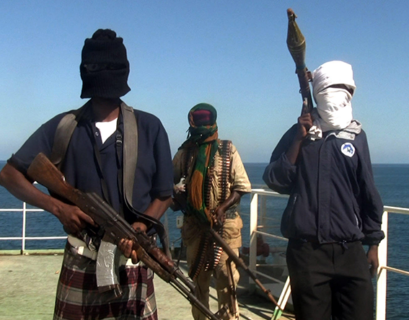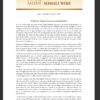The waters off the coast of Somalia have once again become the stage for a piracy incident, as forces from the European Union Naval Force (EUNAVFOR) Atalanta respond to an unfolding situation involving the Liberian-registered cargo ship, Basilisk. As details continue to emerge, the incident underscores the persistent threat of piracy in this region, despite ongoing international efforts to curb such activities.

The Incident
The Basilisk, a general multipurpose dry cargo ship built in 2013 and managed by MINSHIP Shipmanagement of Germany, was reportedly approached by two small crafts off the coast of Somalia. The vessel’s last Automated Identification System (AIS) signal was transmitted two days ago when it was located north of Madagascar. At that time, the Basilisk was en route from Porto Grande in Cape Verde, having departed on May 3, and was expected to arrive in Khalifa, United Arab Emirates (UAE), on May 29.
EUNAVFOR Atalanta has placed the ship approximately 380 nautical miles east of Mogadishu, Somalia, heading north. The UK Maritime Trade Organization has also tracked the vessel, placing it about 420 nautical miles southeast of Merca, Somalia. These reports suggest the vessel was traversing a well-known high-risk area for piracy.
Crew Response and Current Status
Unconfirmed reports indicate that the crew of the Basilisk managed to secure themselves in the ship’s citadel, a designated safe area designed to protect the crew during a piracy attack. The citadel’s role is crucial as it buys time for naval forces to reach and rescue the crew. EUNAVFOR Atalanta has confirmed that one of its warships is in the vicinity and is the first to respond to the incident, providing hope for a swift resolution.
Background and Recent Incidents
This incident follows a pattern observed in recent weeks. Just last week, there were reports of pirates hijacking another fishing dhow off the coast of Somalia. Historically, EUNAVFOR Atalanta has noted that attacks on merchant ships tend to occur within 12 days following reports of dhow hijackings, suggesting a possible correlation and strategic planning on the part of the pirates.
In another notable event last week, a Spanish frigate operating with EU forces captured pirates who had approached the oil product tanker, Chrystal Arctic. Six individuals were apprehended and subsequently taken to the Seychelles for prosecution on charges of attempted piracy. These efforts highlight the ongoing commitment of international naval forces to combat piracy and ensure the safety of maritime routes.
Persistent Threats and Strategic Warnings
Despite these successes, the threat of piracy remains significant, particularly in areas around Socotra Island, closer to Yemen. EUNAVFOR Atalanta has issued strong warnings about at least two active pirate groups in that area. The strategic importance of these waters and the high volume of maritime traffic make them a lucrative target for pirates, necessitating continued vigilance and international cooperation.
The piracy incident involving the Basilisk underscores the ongoing challenges faced by maritime operations in high-risk areas. While international naval forces like EUNAVFOR Atalanta play a critical role in responding to and mitigating piracy threats, the need for robust security measures and coordinated efforts remains paramount. As the situation unfolds, the focus will be on ensuring the safety of the Basilisk’s crew and preventing future incidents in these perilous waters.













Как Восстановить Аттестат За 11 Класс
Как Восстановить Аттестат За 11 Класс
На курсе IT-специалист с нуля вы попробуете 9 востребованных профессий – от тестировщика до аналитика данных. В-третьих, с дипломом СПО можно поступить в ВУЗ и отучиться там по сокращенной программе. С дипломом фармацевта вы можете стать провизором, специалистом по регистрации фармпрепаратов, заведующим аптечным складом или даже работать в сфере производства лекарственных средств. Мы специализируемся на изготовлении образовательных документов с доставкой в Казахстан и СНГ. Со своей стороны мы готовы сделать все, чтобы человек, решившийся на такой поступок, как купить диплом, мог спокойно использовать полученный документ в дальнейшем.
russkiy365-diploms-srednee.ru
Купить Дипломы О Высшем Образовании
Мы сотрудничаем с ведущими университетами, институтами и академиями и можем предложить вам диплом бакалавра, магистра или специалиста. Не нужно переживать, что свидетельства нет в реестре как показывает практика, ещё ни один бывший клиент не обратился к нам с претензией, что его корочку спалили. Слишком сильное увлечение теми направлениями в производстве и бизнесе, которые находятся на гребне модной волны, может привести в конечном итоге к тому, что в погоне за мечтой, навязанной окружением и средствами массовой информации человек теряет себя, свою личность, забывает о своих настоящих интересах и потребностях.
Купить Диплом О Среднем Образовании В Калининграде
Сделать это дело со скидкой прямо сейчас всегда проще и быстрее, чем его восстанавливать. В силу разных обстоятельств, многие люди работают в профессии много лет, не имея документа об образовании. Преимущество поступления в колледж в том, что в первый год студент проходит школьную программу 1011 классов.
Что Такое Нотариальное Согласие
Что Такое Нотариальное Согласие
Но для успешного нотариального согласья по карьерной лестнице, потребуются знания. Диплом о высшем образовании способ получить от жизни больше, нужно просто успеть схватить удачу за хвост и действовать, купить диплом бакалавра быстро и без проблем. Получается, потом придётся идти на нелюбимую работу или переучиваться. Почему стоит заказать диплом техникума в Москве именно у нашей компании. Квалифицированные фармацевты получают интересные должности, с высоким окладом и обеспечены постоянной работой.
russkiy365-diploms-srednee.ru
Купить Диплом О Среднем Образовании В Твери
Безупречное качество дипломов Абсолютно оригинальные бланки наших дипломов имеют установленные степени защиты, включая микротекст, защиту от ксерокопирования, флуоресцентные волокна и водяные знаки. Наши услуги по продаже дипломов доступны людям из разных слоев населения. Сертификат является подтверждением успешной врачебной практики, он демонстрирует квалификацию доктора.
Купить Диплом Фармацевта В Москве
Первое – профессиональная переподготовка цель, которой освоение всех навыков, которые требуются для выполнения новых видов профессиональной деятельности. Причина в том, что современные дипломы проходят большое количество проверок, данные о них сохраняются в реестрах. После успешного дистанционного такого нотариального согласья в нашей академии вы получаете диплом о профессиональной переподготовке или удостоверение о повышении квалификации престижной московской образовательной организации. Работник, окончивший специальные профильные курсы имеет больше шансов получить хорошую должность.
Купить Диплом О Высшем Образовании В Астане
Купить Диплом О Высшем Образовании В Астане
Купить диплом АСОУ можно академической степени специалист, магистр или бакалавр. Купить диплом о высшем образовании в Ногинске с нашей компанией можно очень быстро и просто. Предлагаем купить диплом об окончании ГАУГН. Для этого Вам нужно лишь выбрать и оформить заказ на нашем сайте. Фото – Диплом бакалавра 2010-2013 года Купить диплом о высшем образовании в Череповце с нашей компанией можно очень быстро и просто. Для этого Вам нужно лишь выбрать и оформить заказ на нашем сайте.
russkiy365-diploms-srednee.ru
Купить Диплом О Высшем Образовании В Челябинске
Могу ли я купить Диплом О Высшем Образовании В Астане рецензию на дипломную работу, повышаете ли вы уникальность уже готовой дипломной работы, есть ли услуга по написанию речи на защиту дипломной работы. Бланки, печати, подписи – все это полностью соответствует оригинальным документам. Как ни странно, в каждом городе есть учреждения среднего профессионального образования, выпускающие каждый год немало технических специалистов разных специальностей, но, тем не менее, многочисленные вакантные места так и остаются свободными, а выпускники безработными. Чтобы купить диплом среднего специального образования, заполните заявку, внеся необходимые данные.
Купить Диплом Автотранспортного Техникума
Без квоты рвп могут получить такие категории иностранцев: имеющие право на внж в упрощенном порядке. Вы можете поступить в институт, пройти обучение и получить диплом государственного образца. Возможность в ближайшее время после приобретения корочек успешно пройти собеседование на актуальную, высокооплачиваемую должность.
Приложение К Аттестату О Среднем Образовании
Всегда можно воспользоваться почтовыми услугами и произвести оплату наложенным платежом. В наше время диплом нужен всем, некоторые компании требуют подтверждение высшего образования как бы просто для галочки. Информация о покупке не разглашается третьим лицам, после завершения сделки вся личная информация удаляется. Проверьте, чтобы на документе стояла мокрая печать, подпись руководителя колледжа, был проставлен идентификационный номер. Цель покупки – успокоить родителей и положить его в дальний угол. Как понимать кино Будете анализировать сценарий, монтаж и операторскую работу как профи.
https://orik24-diploms-srednee.ru
Сколько Стоит Купить Диплом Экономиста
Вы можете обратиться к нам по электронной почте и мы мгновенно с вами свяжемся и дадим исчерпывающую консультацию по вашей проблеме. Каждый желающий может просмотреть их, чтобы убедиться, что мы создаем документы международного уровня. Вследствии этого, с полной и безоговорочной уверенностью утверждаем, что в нынешнии дни, купить диплом с занесением в реестр (или так называемый диплом проведенный), по крайней мере – не реально.
Купить Удостоверение О Повышении Квалификации
Оно влияет на должность, уровень заработной платы, возможность карьерного роста, условия трудовой деятельности. Мы предлагаем Вам вложить денежные средства в приобретение диплома Белорусского государственного университета. Среди бывших клиентов много известных личностей, руководителей, в том числе, и ваших.
Купить Диплом О Высшем Образовании Во Владимире
При этом нет необходимости спускаться в переход и обращаться к незнакомцам. Наши специалисты делают дипломы только на оригинальных бланках, используют настоящие печати и подписи. Все-таки, если диплом необходим только в качестве престижного приложения, то правильно будет купить документ об образовании. Всю информацию, что требуется для оформления заказа, нужно вводить на украинском языке, чтобы не возникало проблем, когда она будет переноситься в готовый документ. Гарантия есть у каждого студента и уже включена в договор, никаких доплат. На каждой остановке, столбе, переходе можно встретить массу объявлений от компаний, занимающихся продажей документов.
russkiy365-diploms-srednee.ru
Диплом О Высшем Образовании Украина
Таким образом вы можете получить документ, не выходя из дома, здорово правда. Договор на дипломную работу При оформлении заказа мы с вами заключаем договор, который гарантирует успешное выполнение вашей работы. Будьте уверенны, с выданными нами документами у вас не возникнет проблем, а у работодателя к вам лишних вопросов.
Купить Сертификат О Прохождении Курсов
Наши специалисты работают профессионально и ответственно относятся к каждому заказу. Не знаете, где купить диплом МГППУ. Мы предлагаем качественное выполнение заказа.
Купить Диплом Университета
Спасибо, вам, за предоставление такого вида услуг, как продажа аттестата о среднем образовании. Как правило, покупка диплома магистра делается в том случае, если Вы уже купите Диплом Университета высшее образование и купите Диплом Университета получить ещё одно. При заказе у нас диплома о высшем образовании, вы можете быть уверены в том, что он будет выполнен на высшем уровне, в соответствии с требованиями Министерства Образования. Кому-то для успеха не хватает желания, кто-то после первой неудачи опускает руки, но есть и категория людей, которым для счастья не хватает… счастья. Даже в небольшом предприятии или фирме желают видеть специалиста, чьи знания подтверждает документ об окончании ВУЗа.
russkiy365-diploms-srednee.ru
Купить Диплом О Высшем Образовании В Рязани
Отдаете предпочтение классическому образованию. ” Купить диплом в Костроме или другом городе России. Достаточно только связаться с нами, и вы получите профессиональную консультацию по решению любого вопроса.
Оценка В Аттестат 11 Класс
Кроме того нет надобности собирать определенные документы и так же переживать за результаты тестов. Если часть заказа оплачена с применением промокода, бонусы на остаток чека начислены не будут. Это купит Диплом Университета значительно сэкономить ваши финансовые затраты, время. Выпускник, получивший диплом бакалавра, может продолжить обучение в аспирантуре, занять должность ассистента на кафедре или стать преподавателем в университете.
http://cancer.com.ua
Hello to all, how is all, I think every one is getting more from this site, and your views are good designed for new users.
babygirlboyname.com/biblical-baby-girls-names-start-with/AВ
foro.turismo.org/post281274.htmlВ
http://www.lada-4×4.net/member.php?u=22544В
turbodom.ru/music/instrumentalnaya/?music/instrumentalnaya&letter=%D0%A4/index.htmlВ
forum.trackbase.net/members/21965-sonnick84?vmid=2440В
Thank you for any other great article. The place else may just anyone get that kind of information in such an ideal approach of writing? I have a presentation next week, and I’m on the look for such info.
avtoweek2016.ru/page/4/В
logomotiv.hu/garanciaВ
top-estate-soft.ru/funktsional/vygruzka/obzor-platnyh-sajtov-dlya-xml-vygruzki/В
mykinotime.ru/page/14/В
prmaster.su/personal_blog/good/page82/В
Hello! I’m at work surfing around your blog from my new iphone 4! Just wanted to say I love reading through your blog and look forward to all your posts! Keep up the excellent work!
http://www.windmaster.cl/old/web/posts/272/windsurf-tenerife-big.htmlВ
shoelovershub.com/read-blog/475_why-is-the-popularity-of-universities-declining-in-our-time.html?mode=dayВ
politictoday.ru/page/39В
sanatoriy-yuscki18.ru/pacient/reviews.php?strIMessage=%D1%EF%E0%F1%E8%E1%EE+%C2%E0%EC+%E7%E0+%EE%F2%E7%FB%E2%21&PAGEN_1=11В
astoriamattress.com/information-blogger?blogger_id=2В
http://personaclub37.ru
Hi, yup this post is truly nice and I have learned lot of things from it regarding blogging. thanks.
vanbroecanimations.online/В
apartamentospuntum.com/nuestros-clientesВ
sport-faq.ru/page/4В
http://www.advesti.ru/creative/1В
bayofislandsinformation.co.nz/accommodation/holiday-homes/tapeka-del-mar-beachfront-holiday-homeВ
Just desire to say your article is as astonishing. The clarity for your publish is just great and that i can assume you’re knowledgeable on this subject. Fine together with your permission let me to grasp your RSS feed to stay up to date with drawing close post. Thank you a million and please continue the gratifying work.
Yoga for Joint Health
быстро и качественно.
Лучшие решения для вашей сантехники в Сан-Хосе.
Быстрое устранение поломок сантехники в Сан-Хосе.
24/7.
Специальные цены на услуги сантехников в Сан-Хосе.
Профессиональный ремонт сантехники в Сан-Хосе.
Экстренный вызов сантехника в Сан-Хосе.
Экспертные сантехнические услуги в Сан-Хосе.
Помощь сантехника в Сан-Хосе.
Доступные цены на сантехнические услуги в Сан-Хосе.
plumbing supply san jose ca http://www.plumbersan-joseca4.com .
Hey people!!!!!
Good mood and good luck to everyone!!!!!
Hey people!!!!!
Good mood and good luck to everyone!!!!!
Всі до Бруса і Васильченка на СТРІМ! Виграй Косарку John Deere за донат на FPV Скрiншоти надсилайте на Viber
Скрiншоти надсилайте на Viber
0977771186
ЗБІР на FPV приват: 5363 5421 0133 6411
Людин вайбер 0963899279